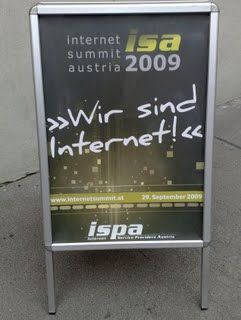Random thoughts
Tuesday, September 29, 2009
Internet Summit Austria 2009
ISPA chairman Andreas Koman opened the session with statistics about Internet use in Austria and an overview of current developments and challenges.
Claudia Bandion-Ortner, minister of justice, admitted her preference for paper files and reminded the audience that the Internet is not an area unregulated by law. There are legal issues specific to information technology, such as data theft and violation of data privacy rights. While fraudsters and other criminals use the Internet, most crimes are media neutral. One area that is closely linked to the Internet, though, is child pornography. Bandion-Ortner referred to the controversial German pilot for blocking access to illegal sites. Needless to say, the same filter technology could be used for censoring access to legitimate information or enforcing intellectual property rights.
Volker Grassmuck delivered a keynote about the reformation of intellectual property law in the digital age. Established “common sense” can block creativity and innovation. Some ideas worked well although most people would have assumed they wouldn’t:
- Shared space pioneered by Hans Moderman–“If you treat people like idiots, they will behave like idiots.”
- Shared code with the Free Software Foundation (FSF)
- Shared profits with the micro-payments of the Grameen bank– “People behave in a trustworthy way when they are trusted.”
On net neutrality Grassmuck mentioned a speech by FCC chairman Julius Genachowski and a refined view on the issue, with net neutrality but with network management to handle congestion or spam and with provisions for law enforcement, and transparency which would allow blocking or throttling certain types of traffic as long as customers are made aware.
There is no one solution that satisfies the needs of content producers, consumers and intermediaries. Working models will require a combination of an agreement between creative professionals and society, markets, free licenses, public subsidies and a “cultural flat rate”.
One of the conference gifts was, ironically, a USB stick with a locked down installation of Firefox using the Tor network to ensure privacy.
The keynote was followed by a lively discussion about intellectual property rights, including but not limited to compensation for the creator of content. The composer Johanna Doderer and the author Gerhard Ruiss pointed out that they want to maintain control over what happens with their works and reminded the audience that creative professionals are typically paid by how often their works sell. Georg Hitzenberger of Play.fm and Bettina Kann of the Austrian National Library outlined some of the challenges with obtaining rights for use in digital media and making content available. For example, the digital Web archive maintained by the Austrian National Library has unreasonably strict access requirements in selected locations only, one person at a time. Franz Schmidbauer touched on legal aspects and the adequacy of intellectual property rights enforcement.
MEP Eva Lichtenberger made an interesting comment about giving young people the ability to purchase digital media without requiring a credit card, quoting the large amounts spent on ringtones where suitable payment solutions are offered by telecom providers.
After the lunch break, Peter A. Gloor gave an entertaining presentation about “Coolhunting by Swarm Creativity” (that’s a lot of buzzwords for a title), explaining how their system combines different inputs–the wisdom of the crowd in the form of the Web, the wisdom of the swarms in the dynamics of fora and blogs, the knowledge in news and Wikipedia–to understand networks, trends and content. “Experts are right – in 50% of the cases. You never know which 50% you have.” swarmcreativity.net and ickn.org have good information about the concepts and the Condor software for non-commercial use.
Two panel discussions about social networks and business on the Internet concluded the agenda.
Labels: austria, events, technology, web2.0
Friday, September 25, 2009
Brain food
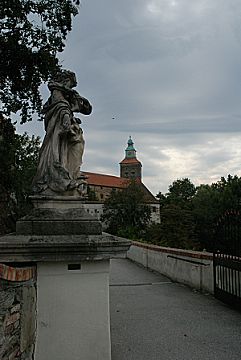
The program started in early September with one week of lectures at the Burg Schlaining conference center. Besides getting an introduction into the concepts of law, registering and picking up the text books and DVDs, we had sufficient time for socializing and getting to know fellow students. On the first evening, the major invited to a reception at the town hall. I appreciated the warm welcome and thoroughly enjoyed the week, learning something new in the relaxed atmosphere of scenic Stadtschlaining and meeting nice people.
Having spent a good portion of my study period with checking bulletin boards distributed throughout the campus for announcements and organizing the study—the Web had not been invented—I was positively impressed how well things were organized here. The lectures and practice sessions are available on DVDs or as video streams, and textbooks are available for all courses, eliminating the need to take illegible notes.
What's nice about the program is the flexibility where and when you study. Of course that flexibility comes with the risk of procrastination, so feel free to ask me about my progress from time to time (read: no more than once a quarter!) as a gentle reminder.
Will I become a lawyer some day? Probably not. I haven't given much thought to how a law degree might change my career plans. Either way, it will be worth it to me.
Tuesday, August 11, 2009
Security, privacy, and an inconvenience
The Central Intelligence Agency (CIA) in 2006 began serving its Website encrypted in an effort to improve security and privacy of the communication.
This is a clear case for a 301 redirect from the unencrypted URL http://www.cia.gov/page to the equivalent encrypted URL https://www.cia.gov/page. Instead, except for the homepage and very few other pages, all requests get redirected to a splash page informing visitors about the site changes:
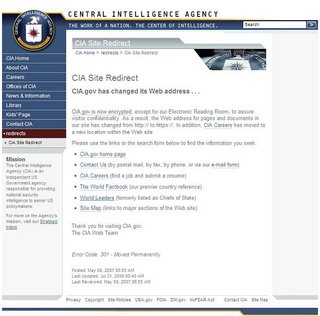
Not only is this a bad idea for search since all those links out there on various sites now transfer link weight to a splash page which is marked as non-indexable. It is also an inconvenience to users who need to navigate to the specific content or go back to the previous page and try again with an edited link.
Even the old URL for the World Factbook, arguably one of the most popular resources on the site, no longer goes to the desired World Factbook homepage directly.
The CIA press release states: “We believe the inconveniences of implementing SSL for the entire website will be offset by increased visitor confidence that they are, in fact, connected to the CIA website and that their visits are secure and confidential.”
The effort to increased security and privacy is commendable, and encrypting all communication with the agency certainly isn't a bad idea. Doing so without the inconveniences would be even better though, and perfectly feasible, too.
Labels: networking, seo, technology
Monday, August 10, 2009
SEO advice: Redirect wisely
Redirects instruct browsers and search engine crawlers that content is available under a different URL. They often go unnoticed as we access Websites. Along with the new location of the content, the server also sends a response code indicating the type of redirect. From an SEO perspective, you generally care about two response codes, 301 Moved permanently and 302 Found:
- 301 Moved permanently indicates that the resource has been assigned a different URL permanently, and the original URL should no longer be used. What this means for Search engines is that should index the new URL only. Google also transfers full link equity with a 301 redirect, which is the very reason why you will often see the advice to use 301 redirects.
- 302 Found indicates that the originally requested URL is still valid, and should continue to be used. Search engines vary in how they treat 302 redirects and which URL they show in search result pages, but generally will continue to crawl the original URL as recommended in the HTTP/1.1 specification: “The requested resource resides temporarily under a different URI. Since the redirection might be altered on occasion, the client SHOULD continue to use the Request-URI for future requests.”
Choosing the right redirect response code
So which redirect response code should you use? Matt Cutts' description how Google treats on-domain and off-domain 302 redirects covers the basic principles and the heuristics that Google used at the time, which to a large extent still apply.Let's summarize the effects of the two most common redirect status codes again:
- 301 redirects transfer link equity to the new URL.
- 301 redirects remove the original URL from the search index.
- 302 redirects often keep the original URL in the index.
The 301 redirect response is appropriate for the following scenarios:
- Content has moved to a different location permanently, for example to a different server name or a different directory structure of the same server. This may be triggered by the rebranding of content where you want all references to the original content to disappear.
- A Website is accessible under multiple host names, such as example.com and www.example.com, or typo catchers like eggsample.com and example.org, but only one name should be indexed.
- A temporary campaign URL is published in direct mail or print advertising, but the landing page has a different permanent URL that will remain accessible beyond the lifetime of the campaign.
- The requested URL does not match the canonical URL for the resource. Often extraneous session and tracking parameters can be stripped, or path information gets added to help with search rankings, for example http://www.amazon.com/Software-
Development- Principles- Patterns- Practices/dp/0135974445
- The original URL is shorter, prettier, more meaningful, etc. and therefore should show on the search engine results page.
- Temporary session or tracking information gets added to the canonical URL. Those URL parameters should not be indexed since they will not apply to other visitors.
- Multiple load balanced servers deliver the content. Indexing an individual server would defeat the purpose of using load balancing. (There are better ways to load balance than having multiple server names, though.)
The “canonical” meta tag
How can you keep the short URL in the index and still transfer link equity? In summer 2008, we started observing that Google somehow “merged” related URLs and treated them as a single entity, showing identical page rank and identical number of inbound links to all of the URLs.When Google introduced the “canonical” meta tag in February 2009, this suddenly made sense. Once multiple URLs are known to refer to the same page, or a slight variation of a page, the index only needs to keep one instance of the page.
The canonical meta tag helps the webmaster of a site who give search engines a hint about the preferred URL. The canonical meta tag also helps search engines since mapping multiple crawled URLs to the same page and indexing it only once just became easier.
Whether link equity fully transfers between multiple URLs mapped to the same page remains to be seen. At least within the same domain, this unification process may allow keeping the vanity URL in the index with a 302 redirect response while still transferring link equity.
PS. For an excellent and detailed description how redirects work, how to configure your Web server and what each status code does, see Sebstian's pamphlet The anatomy of a server sided redirect: 301, 302 and 307 illuminated SEO wise.
Labels: networking, seo, webdevelopment
Tuesday, July 7, 2009
Wiener Neustadt is half way from Vienna to Jesolo
We left home in the dusk on July 1 with our van fully loaded, expecting to reach our vacation destination Jesolo by noon. Shortly after we had passed Wiener Neustadt, we noticed strange sounds under the hood, and the engine temperature started to rise quickly. “Stop engine. Oil pressure low.” destroyed our hope to reach at least a service station.
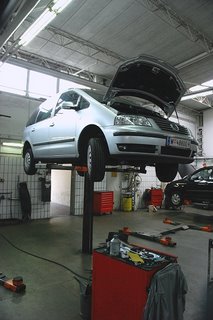 The towing service arrived promptly, we squeezed two child seats and ourselves into the tow truck and still hoped for a quick repair. The mechanic who first inspected our car suspected a more serious problem, and an hour later we had the sad certainty: our VW Sharan had suffered from a broken connecting rod and subsequent damage to the engine at less than 7000 km, “a manufacturing defect”. We would certainly not continue our journey with this car.
The towing service arrived promptly, we squeezed two child seats and ourselves into the tow truck and still hoped for a quick repair. The mechanic who first inspected our car suspected a more serious problem, and an hour later we had the sad certainty: our VW Sharan had suffered from a broken connecting rod and subsequent damage to the engine at less than 7000 km, “a manufacturing defect”. We would certainly not continue our journey with this car.We weren't ready to give up, though. After all we had made travel arrangements, and the kids were excited about our first vacation trip abroad. Volkswagen offers a Mobility Guarantee, which sounds like you would retain your mobility when your car breaks down. It includes free roadside assistance and towing, which was indeed helpful, and a replacement vehicle of Volkswagen's choice for three days. Subject to availability, that is. Three days wouldn't helped much anyway but the rental car partner mentioned they had no large vans available for the rest of the year (mind you, this was on July 1!) and actually had no cars available at all, not even for an hour to drive to the airport to pick up another car. As good as the mobility guarantee sounds, it was pretty useless when we needed it.
It's summer time and most car rental companies were short on cars. In the end we managed to arrange for a reasonable large Opel Zaphira with the help of a wonderful agent at weekrent.com and I took the train back to Vienna to get the car. Meanwhile Andrea stayed at the dealership with two tired kids, not a good way to start a holiday.
We left Wiener Neustadt in the afternoon and arrived in Jesolo late at night, tired but glad that we made it after all.
Monday, June 29, 2009
The return of the curvy cucumber

Announced in November 2008, the return of the curvy cucumber will become effective on July 1, 2009. Now all those cucumbers and carrots will be “allowed” to grow in all shapes and sizes again (not that they cared too much about EC directives anyway).
Standards usually make life convenient. Just imagine what driving a rental car would be like if manufacturers implemented their own concept of speed and steering controls (too bad that other controls like air condition and radio aren't standardized and often not self-explanatory). Or withdrawing money from the bank without standardized bank cards and ATMs. Or connecting to networks if they weren't all using the same protocols.
Regulating the size and shape of fruit and vegetables, on the other hand, doesn't make life more convenient unless you like to see the cucumbers lined up nicely in the fridge. To me, this is mostly an indication of an unhealthy desire to control everything, including Mother Nature. More than two decades ago, the movement which eventually became the Green party started questioning large technology projects, be it nuclear power plants or ecologically questionable hydropower plants. Many of the environmental and energy related issues still need to be addressed. But, at least we have the curvy cucumber back.
Labels: business, technology
Wednesday, June 24, 2009
Absentee voting and security
Absentee voting, and mail voting in particular, present some interesting security and privacy challenges. For the European election, voters who wanted to cast their vote outside of their electoral district could request absentee ballots to vote in other districts or by mail. In a commendable effort to make voting as convenient as possible, the administration only required name, address and passport number for requesting absentee ballots and delivered them to voters by regular mail, leaving ample room for misuse already.
But I was unpleasantly surprised when I found a sticker(!) on my mailbox indicating that “important electoral mail” had been delivered:
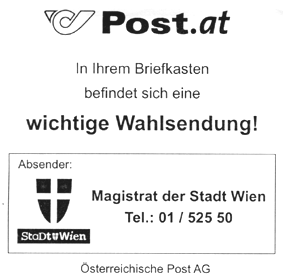
Well intended for sure, but in my opinion the service orientation really went overboard here. With all the trust in the administration, the electoral process and the people in our neighborhood, privacy and security concerns should be considered.
Disagreeing with Jakob Nielsen on security—Password masking makes logins more secure
Disagreeing with Jakob Nielsen on security is easier, especially when he advocates to remove password masking as a means to improve usability and claims that this doesn't lower security.
While not offering a high degree of protection, the password masking does a pretty good job for most situations. Certainly, a determined and skilled criminal would be able to observe which keys are pressed, or use other attack vectors to intercept my Web interactions. I am often surrounded by trustworthy people who still shouldn't know my passwords, don't care about my passwords and even politely turn their eyes away while I am logging in. Whether showing someone a Website or doing a demo to a larger audience, accessing protected areas of a site in a semi-public environment like a desk-sharing area at work or logging in from a mobile device, those little stars or dots protect my passwords well from becoming exposed.
Security and usability should not be conflicting objectives; in fact usability is an important aspect for any security system, or users will work around usability issues and use it in unintended ways, like copying and pasting passwords from a text file as Nielsen mentions. An extra checkbox to enable password masking just adds complexity to the user interface and may confuse users more than not being able to see their password.
Typing passwords on mobile devices (or foreign keyboards, for that matter) can be challenging. Some smartphones like the iPhone or the Nokia N95 show the letter as typed but then quickly replacing it with an asterisk, which is a reasonable compromise.
Instead of cluttering Web forms with additional checkboxes, web developers should demand that browsers and mobile devices provide an option to remove password masking when desired by the user. This would maintain the current level of security by not exposing the passwords to people looking over users' shoulders and address the usability issue for those who have difficulty typing their password and would benefit from visual feedback.
Until then, use this JavaScript bookmarklet to unmask password fields as needed:
for(var i=0;(var a=document.getElementsByTagName("input")[i]);i++){
if(a.getAttribute("type").indexOf("password")!=-1){
a.type="text"
}
}
window.focus();
(all on one line, or simply drag the Unmask passwords bookmarklet link to your bookmarks).
PS. More ways to reveal passwords in a controlled manner can be found in Martin Brinkmann's blog post Reveal your saved Passwords in Firefox.
Labels: technology, usability, webdevelopment
Friday, June 5, 2009
World Environmental Day 2009
Every yellow dot represents a flight with at least 250 passengers.
The animation was developed by the ZHAW Zürcher Hochschule für Angewandte Wissenschaften in cooperation with the Swiss science center Technorama (Larger version of the Air Traffic Worldwide video from ZHAW).
Watching this it becomes clear how even smallest improvements in fuel efficiency, reduction of emissions and optimization of flight patterns reduce the environmental impact (not that flying or most other forms of transportation will ever become eco-friendly). Smart traffic and transportation is also a theme in IBM's Smarter planet initiative.
So what did I do on World Environmental Day 2009? Nothing special, I used public transport as I do whenever possible, looked for local, organically grown food when doing my grocery shopping at the Naschmarkt (although a recent study suggests that shipping fruits and vegetables from warmer countries like Spain may be better environmentally than growing them in greenhouses locally, so much for trying to do the right thing), separated my waste—and calculated my ecological footprint at ecologicalfootprint.com and myfootprint.org, a great reminder how many of us use an above average share of natural resources.
Labels: travel
Saturday, May 30, 2009
IE6 DOM weirdness: It was the base and not the comma
Fortunately I had just received a new ThinkPad (more about that later) and hadn't upgraded Internet Explorer yet. Testing with IE6, my code failed miserably. Debugging with the indispensable FireBug light tool revealed that a shared library function for accessing meta information didn't return any information. The very same library function was working nicely on the production Web site, though; at least we hadn't heard any complaints, which given the percentage of users accessing our Web site with IE6 was highly unlikely.
Staring at the screen in disbelieve, our resident jQuery guru eventually found the culprit. Unlike with the infamous Undefined is null or not an object problem, it was not an issue with an extra comma this time.
Rather, IE6 seems to get the structure of documents containing a
base tag wrong, making subsequent meta and link elements children of the base element, turning this source
into this DOM tree:

So the selector which was correctly looking for
html > meta would fail in the rare presence of a base tag, such as on a test page created by yours truly. The quick fix was a slightly less efficient selector html meta, and we were once again painfully reminded that IE6 tends to behave differently from current browsers and requires separate testing.Related information:
- Justin Rogers, BASE tag changes in IE 7 with Examples
Labels: javascript, webdevelopment, windows
Monday, April 6, 2009
301 Moved permanently
The move went well and almost according to schedule.
We started packing on Tuesday, slowly filling a corner of my apartment with moving boxes. Christian had volunteered to help on Thursday, so we spent most of the day hauling some 30 boxes down three floors from the apartment, stuffing them into the van, driving to the house and unpacking stuff there so we could later reuse the boxes.
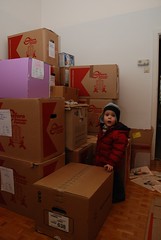


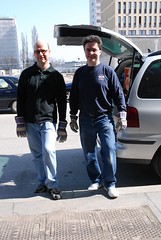
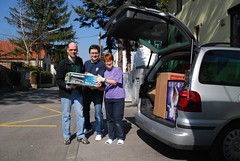
After three tours back and forth, wir hatten fertig.
Friday night was the time for the next round of packing boxes, and again we filled the storage space quickly. Amongst the packed stuff were some treasures that had long been lost, including two small booklets which were hidden under a pile of photographs, and a set of wedding pictures which mysteriously showed up behind a teapot!
Saturday was really the big moving day, with more boxes as well as furniture and other heavy stuff. Fortunately we had even more helping hands, and with a convoy of a rental transporter and two additional cars managed to move “everything” in just three more tours.
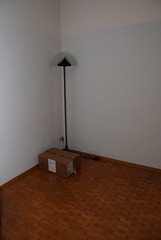
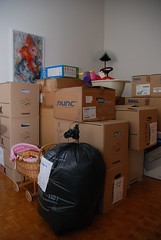

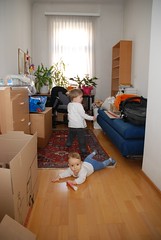
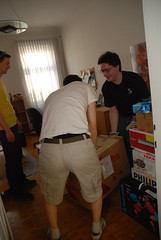
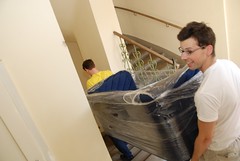
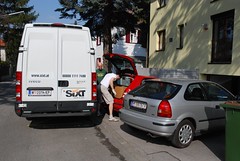

A big thank you to Christian, Michael and Rainer; you guys were absolutely terrific, and we would have never managed to move in two days without your great help.
We will spend the next few weeks organizing the new home and moving the remaining, less needed stuff that we left in the apartments. The house is currently filled with boxes waiting to be unpacked and things look slightly messy. Nevertheless we enjoyed the first night in our new home, and Elias tiptoeing over to our bedroom and giving us a gentle wakeup the next morning.
Lastly, we had our DSL line installed today; now if only I could find all the cables in one of the boxes…
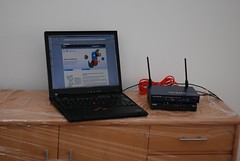
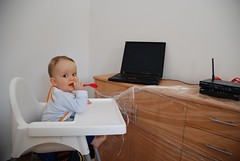
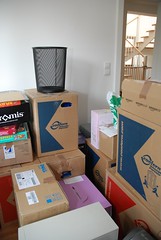
Sunday, March 22, 2009
rsync does work with plink
Unable to read from standard input: The handle is invalid.
rsync: read error: Connection reset by peer (104)
I first posted this problem to comp.security.ssh in 2005 but never received a solution, until now.
Frank Behrens published cygnative, a small wrapper program that resolves an incompatibility between cygwin and Win32 native programs. With cygnative, invoking rsync with plink as the remote shell works like a charm:
rsync -ave "cygnative plink -batch" source target
Thank you, Frank!
Labels: networking, windows
Thursday, March 19, 2009
We are moving
Help needed!
We greatly appreciate any help you can give us with the move, including packing and unpacking, disassembling and reassembling furniture, moving stuff around, and last but not least looking after the kids (that is, feeding Daniel during the day as needed and keeping an eye on Elias when he returns from kindergarten, or taking him to the nearby playground, weather permitting). Hints and tools for moving are also welcome.
Please kindly let us know if you can help us with the move. Food and drinks will be provided at the house.
(Last updated March 31, 2009)
Monday, February 23, 2009
Amazon.com: User experience delivering value
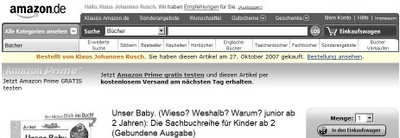
At first glance, the notice would appear to drive customers away from buying; however Amazon.com has a long-standing reputation for innovation in online commerce and good customer service (although I have been less satisfied with their handling of e-mail correspondence lately) so this didn't come as a complete surprise.
Good user experience design is all about delivering value to the customer, and to the business too:
- The customer may have bought the product earlier and order another copy as a present, which was actually the case for me.
- Some products, such as blank CDs/DVDs, lend themselves to repetitive orders. Knowing that this is the same product ordered before is reassuring to the customer, which means more business with fewer clicks.
- In the unlikely case that a customer accidentally orders the same product twice, chances are that she would return the product for a refund, incurring shipping and handling cost for the business; therefore not shipping the product in the first place is not only the most customer friendly, but also the most cost effective solution.
Links:
Labels: business, ibm, kudos, technology
Apple juice and milk
I will remind myself that food and typing don't go well together and enjoy the comfort of a clean keyboard for a while before falling back to my bad habits :-)
PS. Speaking of milk, on Saturday night we went to the cinema to see Gus Van Sant's beautiful and highly acclaimed movie Milk on the life of gay rights activist and politician Harvey Milk, portrayed by Sean Penn, who just received an academy award for his performance this weekend.
Saturday, January 31, 2009
Google: This site may harm your computer
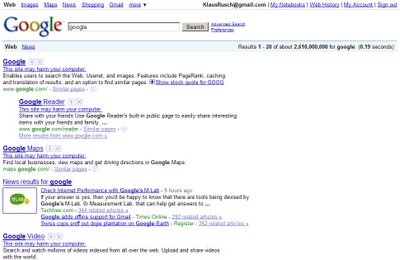
Labels: google, technology
Wednesday, January 14, 2009
Summer inside, winter outside
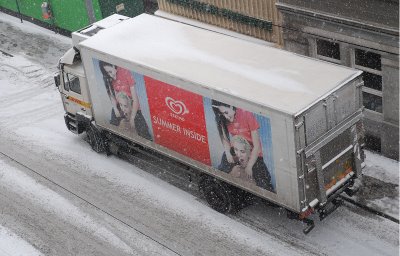
We had this winter's first snow today in Vienna (not counting the few snowflakes back in December). Fortunately temperatures are up again after a rather chilly week, and that was not just because Russian gas stopped reaching Europe.
Labels: personal
Thursday, January 1, 2009
Happy New Year 2009

Wish you Happy and Prosperous New Year 2009!
We returned to Vienna tonight from our family tour to Salzburg, Munich, Dornbirn and Salzburg again.
It was good to see our families again, including the first meeting of little Daniel with his great grandmothers. At the same time it feels like we spent most the last 10 days driving (or, getting stuck in traffic jams), so we are glad to be home.
Wednesday, December 31, 2008
0101001011101010111

Labels: ibm, technology
Wednesday, December 24, 2008
Season's Greetings 2008

Festivus, Kwanza, Christmas, Hanukkah, Solstice, whatever you celebrate at this time of year: Happy holidays and all the best for the new year!
PS. Daniel wasn't unhappy at all with the hat, except of course when we shot the picture.
Labels: personal
Wednesday, December 10, 2008
I know, I know …
Labels: personal
Tuesday, October 7, 2008
Jamming at the InnovationJam™ 2008

Want to explore how organizations can transform themselves into truly global enterprises of the future? Ready to collaborate with technology and business thought-leaders?
Join the InnovationJam™ 2008.
Labels: business, innovation, technology
Monday, October 6, 2008
Our first car
“So you don't drive?” would often be the next question. I do drive, and have accumulated thousands of kilometres on the road on business and holiday trips, with more than 70 car rentals over the years. I also signed up for car sharing a few years ago and enjoyed the convenience of having access to a wide range of vehicles within walking distance from my home.
In 1993 I rented my first car in Vienna for the relocation from the dorm to my apartment. Moving the few belongings back then took multiple trips, and we spent all day moving boxes.
Most of my initial driving experience, oddly enough, was on the left side of the road. While consolidating our European Web hosting infrastructure in North Harbour, I travelled to the UK frequently. The first time I was scared to death, but driving on the left side turned out to be less challenging than I had expected, with the notable exception of multilane roundabouts which I still find tricky. Only once on a business trip to Mulhaddart near Dublin I got onto the wrong side of the road after exiting a petrol station. Fortunately traffic was low and I realized the mistake and changed lanes when I saw a car approaching on “my” lane.
Driving in Australia in 1998 added another challenge: Driving on the left side of the road was easy, I had enough practice with that, but Australian cars also have the controls for wipers and indicators exchanged. I don't want to know how many times I switched the wipers on when making a turn, on a perfectly sunny day.
Did I mention guys care about cars? In August 1999, when the weather forecast for the UK left little hope for clear sight of the total solar eclipse, our friend and hobby astronomer Gurbir Singh decided to abandon the camping ground in the UK and instead take a flight to Austria. Now we had a reason to get serious about eclipse watching! We agreed to meet in Pinkafeld, I bought a tele lens for my camera and a tripod, made reservations at the high school dorm, and ordered a car from Hertz.
Fortunately their reservation system didn't check for availability. When I arrived at the counter a slightly grouchy clerk told me they had to pick up the car from another location first but they would have a car for me shortly. The side effect was that we got a free upgrade. Gurbir liked the car too and acknowledged that working at IBM seemed to pay off if we could afford the latest Volvo model. I think that he was mildly shocked when I mentioned we had rented and didn't actually own a car.
We had a great day in Pinkafeld, finding a good watching spot, (not) learning to juggle, waiting for the wonder of nature. The eclipse was fascinating; everything seemed so calm and peaceful, even the birds turned silent.
On our tour through the Baltic states, Lithuania, Latvia and Estonia, in 2002 something was wrong with our car's theft control, and the car would often refuse to start immediately and require a few tries. No big deal, only once when we were waiting in a long line to board a ferry and the car wouldn't start it was slightly embarrassing. Towards the end of our trip, our vehicle was clamped by the police on Neringa for stopping briefly next to the tourist office(!) Too bad I forgot to take a picture of my first and last clamping so far.
It was on our honeymoon trip to Mauritius in 2005 where we got the smallest car ever, which was fine for day trips without luggage and quite convenient on the narrow roads. We also learned the art of bargaining with car rental staff there. On the first rental, we paid the quoted price minus a “special discount”. The next day, we claimed our customer loyalty bonus and got another discount. On the third rental we appealed to the renter's slogan “We try harder” for an even better deal. The savings weren't substantial, but the bargaining was fun. Of course, for less than the cost of the car alone we could have hired a taxi driver to take us around all day long, but we preferred touring the island on our own.
Fast forward to 2008.
This morning I picked up our new car from the dealer. Our first car. From our renting experiences we pretty much knew what we wanted, a large van, removable extra seats, and reasonable fuel efficiency. We had rented a Seat Alhambra last summer for our trip to Vorarlberg and had been pleased with the vehicle. Our choice fell to the comparable Volkswagen Sharan in the BlueMotion version, which has improved fuel efficiency—6 l/100 km, or 39.2 mpg (US)—and reduced emissions.
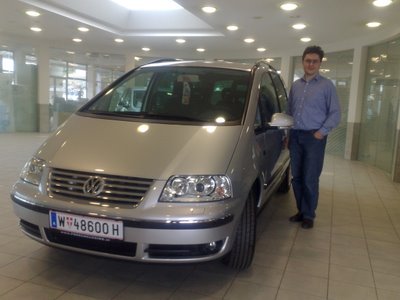
What happened to the couple that happily lived for many years without owning a car? Getting suitable cars had become increasingly difficult, especially around public holidays. Car sizes vary, and ordering a full-size wagon doesn't guarantee you can easily accommodate all passengers and luggage; we once even had to uninvite a friend who was planning to hitch a ride with us. More than once the clerk at the rental company was trying to please me with an upgrade to a luxury car and was disappointed when I only cared about the size of the trunk. No matter how nice a Mercedes E class may be (and it has a fairly big trunk), when it comes to fitting two child seats, two strollers and a few suitcases, there's nothing like a van.
Also we will soon move to a residential area with more distant grocery stores, less frequent public transport connections, and no car sharing station nearby. While I plan to use public transport often still, the car will be convenient for occasional tours to the shopping mall, picking up construction material and furniture, and the like.
So next time someone asks me the question, I will have a different answer.
Wednesday, September 3, 2008
Google Chrome first impressions
But then of course it's hard to ignore a new browser when it's launched by Google. Matt Cutts quickly blogged about the Google Chrome announcement and conspiracy theories, and the search engine guessing feature in particular caught my interest.
www.ibm.com has supported OpenSearch for years and it's good to see a browser finally making good use of the OpenSearch description and providing access to custom search engines using keyboard navigation. With the OpenSearch definition for IBM Search enabled, typing ibm.com Green IT selects IBM Search as the preferred engine for that search:
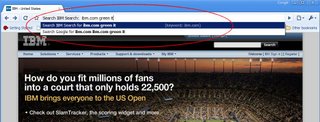
The same can be achieved in Firefox with keywords, albeit not as easily.
Rendering of XML content including RSS news feeds leaves much to be desired. Hopefully Google will add full XML rendering support and integrate a feed reader soon.
Incognito browsing is another neat idea, it won't help much to preserve your privacy but could be useful for testing when you don't want all the test pages to clutter your browser history.
One prerequisite for me using Chrome is support by RoboForm which keeps track of all my accounts and passwords. RoboForm does not work with Safari but hopefully with Chrome being open source will support this browser. Web development tools that work with Chrome will be the other deal breaker.
In the meantime I will continue to experiment with Chrome and see what else Google's latest brainchild has to offer.
Labels: technology, webdevelopment
Thursday, August 14, 2008
'undefined' is null or not an object
This script worked perfectly fine in Firefox, in Seamonkey, even in Opera but failed miserably in Internet Explorer with the not so helpful error message 'undefined' is null or not an object:
var items = [
{id: 'type', condition: !document.referrer},
{id: 'link', condition: !!document.referrer},
];
for (var i=0; i < items.length; i++) {
var item = items[i];
if(typeof(item.condition) == 'undefined' || item.condition) { // Bang!
// do something useful
}
Can you see the problem (and why this works in Mozilla)?
Labels: javascript, webdevelopment
Wednesday, July 30, 2008
House update
Elias was very excited as he moved around the house (he had slept through the two times we had seen the place before) and seems to like it. He quickly made friends with the two children next door, too.
The house was completely renovated not too long ago, so only minor adaptations are required. We plan to furnish the house within a month or two and move in by autumn.
Needless to say that we are very excited and happy about this and looking forward to our new home.
Thursday, July 10, 2008
Microsoft DNS patch KB951748 secures Internet access too well
After a lengthy failed attempt to diagnose a family member's “my Internet no longer works” problem over the phone I saw the BugTraq alert “Microsoft DNS patch KB951748 incompatible with Zonealarm” late at night. Sure enough, uninstalling the update nicely resolved the problem.
The other possible workaround, turning off the firewall completely, would be more risky than living with the spoofing vulnerability until this incompatibilty gets fixed.
Labels: technology, windows
Tuesday, July 8, 2008
What do all the numbers mean?
When Feedburner reports 2686 readers, does that mean 2686 folks actually read the blog, or once subscribed to it and never came back? So Charlie is running an experiment to determine who's actually reading, how people find out about the blog etc. and as an aside get really popular. This is social marketing at its best, so let's pass on the word and see just how popular we can get this.
Link to the post: http://www.thisisgoingtobebig.com/2008/07/an-experiment-w.html
Labels: metrics, technology
Sunday, June 29, 2008
Unknown error in XPath

I guess this was the perfect greeting card for me, better then the cute dog blowing up a birthday cake which was supposed to show :-)
Friday, June 20, 2008
Happy anniversary, Marriott Rewards!
High class properties around the globe, including hotels and extended stay suites, a painless online reservation system that doesn't require me to memorize lengthy membership numbers and company rate codes and loyalty to customers—my points never expired even when I didn't stay with them for a while—make Marriott Rewards a great program.
By contrast, Hilton HHonors not only forfeited my points but also canceled my HHonors account, in line with their terms of use, when I failed to accumulate points while the property I had usually stayed at was closed for renovation. (As a gesture of goodwill they did offer extra points for additional stays to compensate for the loss.)
Most customer loyalty programs are free. One notable exception is the Accor Favorite Guest program, which offers reductions on standard rates, reservation priority, gift vouchers and partner advantages like other programs do, “for only 130 euros per year”.
The quality of the customer loyalty programs may not be the most important factor when choosing accommodation, but a good program certainly helps with the decision where to stay.
Firefox 3

While I consider raw traffic numbers only mildly useful and the hunt for traffic records somewhat old-fashioned (when IBM did run the Olympics Websites we would report record traffic numbers, and with the technology available back then the numbers were impressive, but that was in the 1990ies) I gladly did my part to set the world record. I mean, how often do you get a chance to be part of a world record, even if your contribution is only 1/8290545.
I even installed Firefox 3 :-) and for most parts have been satisfied with the result. The only complaint I have is that the installation overwrote the previously installed Firefox 2 despite placing the new version in a different directory, and sure enough some extensions were considered incompatible and therefore disabled.
Multiple Internet Explorer versions can coexist on the same machine thanks to the wonderful Multiple IE installer, can we please get an easy and automated way to run multiple versions of Firefox without fiddling with profiles?
Labels: technology, webdevelopment, windows
At home with two boys
After a few days at the AKH Wien, Daniel was transfered back to the birth clinic on Thursday, and we returned home on the weekend.
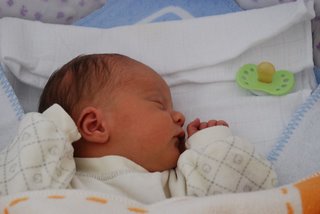
Daniel is doing great; he mostly sleeps through the day and becomes more demanding at night (so please don't ask if we get much sleep!)
We greatly appreciate all the help we received from friends and family, a big thank you to Helga and Thomas who took care of Elias at 5 a.m. as we went to the clinic, Simone and Michael for having Elias over the weekend and my in-laws for looking after Elias while we were away.
Thanks also for all the kind wishes and greeting cards!
Monday, June 9, 2008
Daniel Nikolas is here

Our hearts are full of love for Daniel Nikolas. Our boy arrived on Saturday, June 7 2008 at 5:26 a.m., slightly earlier than expected.
Little Daniel is currently at the AKH Wien for medical observation. The whole family is doing well, and Elias is excited about the arrival of "baby Daniel, baby Daniel, baby Daniel". More later, now back to the hospital.
Friday, June 6, 2008
EURO 2008 in Austria and Switzerland about to start
The only reason I care really is that our apartments are close to one of the venues, the Ernst Happel stadium, and we expect to see and hear crowds of fans passing by.
One of the positive side effects of the event was an improvement to the already excellent public transport system. The U2 metro line was extended to the stadium and will be extended further in the coming years. The upcoming event certainly added a little pressure to complete the extension on time.
The most notable change, however, has been the plethora of cars decorated with national flags, mostly Austrian, some foreign, and a few mixed. Signs to the stadium and the fan zone in the city center have popped up everywhere over the last few days, all kinds of merchandise are offered (anyone care for a football shaped loaf of EURO 2008 bread?), additional waste bins have been installed, and even the sausage stand around the corner looks much more colorful and inviting than usual.
We had actually planned to leave Vienna for the duration of the event and go on vacation but had to change our plans, more on that later. Let's hope for some exciting matches to please the fans and most importantly for a peaceful event.
To probe further: Official UEFA EURO 2008 Website
Sunday, June 1, 2008
Buying a house
We did view the house twice and made an offer last week. The owner has accepted in principle, so now we need to work out the contract details. We are very excited about this and will post details and pictures as soon as we close the deal.
Thursday, April 24, 2008
PowerPoint: No comma, please
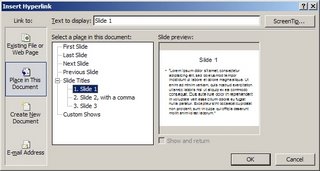
This seemed to work nicely for most slides but not for the particular slide he was trying to link to, and PowerPoint would not even show a preview in the hyperlink dialog box:
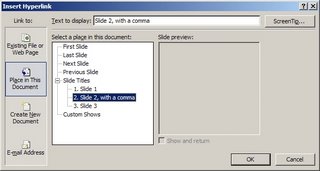
The programmer in me quickly scanned through the slide looking for “suspicious” elements, the only thing that caught my attention though was an innocent looking comma.
Turns out the comma is indeed the culprit, and the bug is well-documented in the Microsoft knowledge base: The hyperlink to a slide does not work when a comma is contained in the title of a slide presentation in PowerPoint.
Removing the comma, placing the hyperlink and then adding the comma back does seem to do the trick. Or, just don't use a comma.
Labels: technology, windows
Saturday, April 19, 2008
Usability: When forward goes backward
Besides being too long (read: I stopped answering the survey once I figured this would take me longer than I was willing to click through question after question) this particular survey had an interesting usability problem: For some reason, the forward link to move to the next question is on the left, whereas the backward link is on the right:
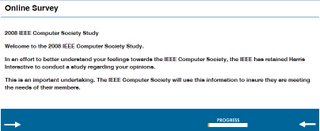
The designer may have considered reading order or attempted to make the site more accessible by putting the more frequently used option first, which would be commendable, but the result is a poor navigation scheme. I would be curious to know how many respondents get frustrated about this and abandon the survey.
Labels: usability
Friday, April 18, 2008
VPS, PDC, DVB, EPG—Why can VCRs not just work?
In the early days setting the timer right may have been challenging, and too often the program would change or fall behind and the tape would contain a different program, or a cut off film. Then came the Video Programming System (VPS) and ShowView, which made programming VCRs easy and greatly increased the likelihood of recording the desired program, and later Programme Delivery Control (PDC).
Everything seemed fine until last year when a decision was made to discontinue analog TV broadcasting in Austria and switching to Digial Video Broadcasting (DVB-T). The television system had maintained backwards compatibility with the great many enhancements over the years, from black-and-white to color, from mono to stereo and dual channel audio. This time, however, new equipment would be needed in the form of DVB-T receivers, and of course that means one for each TV set and recorder.
Our first attempt with a twin receiver bought on EBay was a dismal failure. The device seemed malfunctioning and vendor support was non-existent (more precisely, we were unable to locate the vendor, which seemed to have gone out of business). We happily lived for a few weeks without television.
Eventually we got a nice Sony HXD-870 HD/DVD recorder with built-in DVB-T tuner and at first were quite happy. Setting up the device was easy (except for the fact it did not recognize Austria as a country) and we were back to receiving and recording TV programs.
Although the new recorder supports VPS/PDC it does so only from analog sources, which are no longer available, but not from the digital signal despite the fact that the VPS signal is sent digitally as well. The new Electronic Program Guide (EPG) is convenient, but there is no way to tell the recorder to start when the program starts. Instead you can manually tweak the time range to increase the likelihood of recording the full program.
If that wasn't bad enough already, when we switched to daylight savings time, or summer time as it's called here, the program guide appeared to be off by one hour and so were all recordings. There is a timezone menu but toggling daylight savings time on and off did not seem to make any difference.
The Sony support Website was less than helpful. The only firmware upgrade was for the UK version of the recorder and fixed an unrelated problem that we hadn't encountered.
Fortunately a kind soul owning the same device came to rescue and shared instructions how to overcome this bug by switching to a different time zone and then rebooting the recorder. We have since been running on Helsinki time and had mixed success in recording programs.
With all the advances in technology and three-letter acronym features, we are essentially back to the functionality in the early days of video recording, manually setting times and hoping for the program to stay on schedule.
Why can VCRs not just work?
Labels: technology, usability
Tuesday, April 15, 2008
Back from vacation
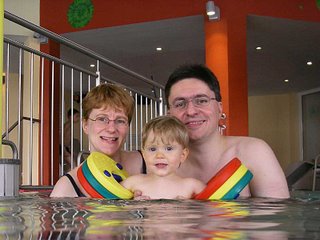
This is the second time we stayed at this hotel, and we had a great time again. Elias enjoyed the many opportunities for playing, sliding and swimming, and the hotel even offered introductory Tai Chi lessons (as I found out afterwards, a different Tai Chi style from the one we learn, which would explain why moves by the same names would feel different).
Labels: personal
Monday, March 24, 2008
Goodbye, Indy!
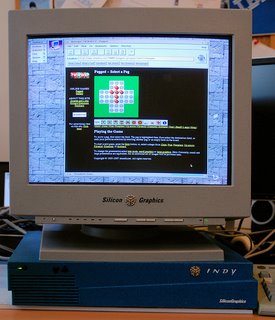
Introduced in 1993, the Indy for a long time was the workstation to have, powerful and good looking, too. When EuNet, PING and Computerwelt offered a fully equipped Indy workstation as the reward for the best Austrian Website, my good friend Peter Wansch and I submitted The WWW Entertainment Package, a collection of classic board games ported to the Web from the like-named OS/2 games package that Peter had developed.
I had just learned the basics of writing CGI scripts and managed to get four games up and running. Although playing games over the Web was kind of slow in the pre-JavaScript, pre-AJAX era the gaming site was very well received and generated both lots of traffic and nice feedback from gamers around the world, too. We asked people to register for free access, we made it easy for them to vote and we spent a considerable amount of time answering e-mails and encouraging games to vote.
To make a long story short, we won. In hindsight, we had a pretty good Website that was actively used and would continue for years, but some other submissions were pretty slick, too. I guess we didn't just win for having the best product, we won because of good marketing.
The news reached me while participating at the WWW3 Conference in Darmstadt and while I had been hoping for this when it happened I could hardly believe it—we did it!
What followed then was a huge disappointment. We learned that we would not receive the machine at the official ceremony at Café Stein but only a few weeks later, and what's worse in a different configuration: The 5 GB harddisk that was originally advertised may seem small today but would have been perfectly adequate back then, what we got instead was a machine with a much smaller harddisk, barely sufficient to hold the base operating system and multimedia tools, and no CD-ROM drive to install software from.
Filesystem Type kbytes use avail %use Mounted on
/dev/root efs 439704 408189 31515 93% /
Now the Indy came with great connectivity already, including Ethernet and ISDN ports, only my home office had neither and upgrading the machine with more memory, a larger harddisk and a CD-ROM drive (from Silicon Graphics only, others would not boot!) was too expensive an option. We could have sold the Indy, probably for a good price. Seriously though, if you got an Indy, would you sell it? (Don't answer, please.)
So for many years this marvel of technology has been putting on dust and remained unused. When I booted the Indy today it started up nicely, only issuing one warning message: “WARNING: clock gained 1856 days”
The auction has a few more days to go and already has six bids. It is about time that someone starts using this machine, and time for me to say Goodbye. It has been a difficult relationship, and yet I will miss this electric-blue colored pizza box.
PS. At the age of fifteen the Indy is still a modern computer. For some really old computers, have a look at the Old Computers online museum.
Labels: personal, technology
Let it snow, let it snow, let is snow

Happy Easter, or whatever you celebrated over the last few days. As reported by Time Magazine Good Friday this year happened to coincide with many holidays of other religions: Purim, Narouz, Eid Milad an Nabi, Small Holi and Magha Puja.
We spent the Holy Week in Salzburg with Andrea's parents and had hoped for some nice warm spring days to go for walks or just hang around on the terrace—not so. With a forecast for cold weather and even snow over the weekend, we saw the traditional Sunday Easter egg hunt at risk and decided to cheat just a little, letting the Easter bunny hide his eggs on Saturday already. Elias was quite happy about this and managed to quickly spot and collect all baskets with eggs, chocolates and yet another picture book.



Moving the egg hunt turned out to be a smart choice. Sunday started out pretty nice as we went to church but then it would snow heavily for hours. Despite the car rental agency giving us an upgrade to a 4 wheel drive we even extended our stay at my in-law's place by another night and only headed back to Vienna today.
Now see what our car looked like in the morning! We had a pleasant drive though, with surprisingly light traffic on the highway.
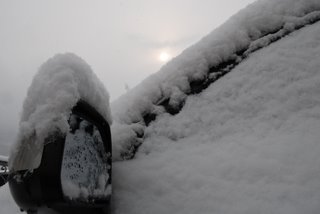
Labels: personal
Tuesday, February 26, 2008
Safely landed
Three colleagues from Bratislava and I made it to the IBM facility in Herrenberg, which wouldn't be noteworthy except that the newspapers had detailed reports about an emergency landing of a Dash 8-Q400 at Vienna airport yesterday, and sure enough our plane was a Dash 8-Q400 too. The board magazine highlighted the benefits of the aircraft, such as lower fuel consumption than jets at relatively high speeds, the ability to take off and land on short runways, propellers which can be repositioned for excellent climb and cruise performance, and noise and vibration reduction for the cabin.
I didn't feel particularly unsafe even after reading the morning news as the many problems reported with this type of aircraft have been mostly related to the landing gear and there haven't been any serious accidents. Sure enough our flight went smoothly and we safely landed in Stuttgart.
Labels: travel
Monday, January 21, 2008
No wonder that this world blows itself up
This supermarket chain runs a fairly elaborate customer loyalty program, with some discounts applying only to members of the program. There used to be some problems in the past with keeping the signs and the computer systems in sync but not this time. There was no technical problem here, just an oversight on the customer's part.
The customer eventually agreed that the discount wasn't applicable, since she was not and did not want to join the customer loyalty program, and decided to return the tomatoes, mumbling something along the lines of "Everything is getting so much more complicated, no wonder that this world blows itself up."
Now I wouldn't consider the customer loyalty program a serious threat to the world, and actually enjoy the benefits offered, although it means knowingly giving up some privacy in exchange for discounts. (I will gladly post my grocery shopping list here too if someone is interested :-))
Scanner cash registers and storing membership information electronically on the ATM card are certainly vast improvements in usability and convenience over the old manual cash registers (I do remember checking my weekly grocery bill for errors back when I was a student, a rather slow process given the long list of just prices, but it was worth the effort more than once) and collecting discount coupons.
Those of us working in a technology industry should remember though that not everyone will want to or have the ability to adopt new technologies, and those who opt out must not be left behind.
Otherwise, this world will blow itself up ...
Labels: technology, usability
Saturday, January 19, 2008
Learning Tai Chi
Yesterday morning (at 8 a.m., I am not exactly a morning person so this was the hard part) I had my first Tai Chi lesson. Our teacher, Chung Hsien Jung, has won national and international Tai Chi championships, and more importantly creates a friendly and inviting atmosphere. Watching him perform a sequence of postures and moves is simply impressive and a good motivation to spend an hour or two every week to practice Tai Chi myself (not that I expect to get anywhere close to this level, but that's beside the point).
Tai Chi is based on the theory of the Taoism and the principle of the contrasts of Yin and Yang. The sequences of moves are used for supporting healthiness, relaxation and physical balance. We learn the Chen Style (陳氏), the oldest form of Tai Chi characterized by the combination of slow, supple and fast, powerful movements. To some extent the concepts and the moves reminded me of Jujitsu, which I had practiced many years ago.
The first lesson was fun, so I will be back again next week!
Labels: personal
localhost considered harmful
"localhost" DNS records in a domain should not be confused with the ".localhost" TLD defined in RFC 2606 Reserved Top Level DNS Names, and should be configured on nameservers. I haven't been able to find a requirement in the RFCs to have a "localhost" entry in a domain, nor can I think of a compelling reason for keeping the entry as long as nameservers for a domain are properly configured to handle queries for "localhost.".
RFC 1912 Common DNS Errors explains how to configure the localhost and 0.0.127.in-addr.arpa zones:
The "localhost" address is a "special" address which always refers to
the local host. It should contain the following line:
localhost. IN A 127.0.0.1
The "127.0" file should contain the line:
1 PTR localhost.
and recommends to not define "localhost" with the domain name appended.
Thoughts on removing "localhost" from zones, anyone?
Labels: security, technology
Monday, January 14, 2008
Blogger
I started playing with Blogger and within minutes had a basic template and publishing to my Web server working. The template language looked sufficiently flexible, and the backing by search giant Google made this an attractive choice too.
WordPress would have been next on my review list. The hosted options are probably comparable, with WordPress offering some advanced features for a fee. Anita Campbell has published a great article about moving a blog from Blogger to WordPress, citing a number of good reasons why the latter is a much better option, although Blogger was “simple to set up and use”. Good enough for me.
One minor limitation I noticed is that Blogger only creates a single XML feed but no category feeds, which can be created easily using the rich Blogger data API.
The only complaint I have about Blogger is the incorrect rendering of ampersand and angle quotes:
- Ampersand: &
- Angle bracket open: <
- Angle bracket close: >
They are represented correctly as entities in the XML feed, but rendered as plain characters in the HTML version. This looks like a bug that should be easy enough to fix.
Labels: google, technology
Sunday, January 13, 2008
IG-L
Since 2006, the immission control act Immissionsschutzgesetz-Luft (IG-L) has been enacted in Austria, which allows authorities to impose certain restrictions on production facilities, traffic, and outdoor combustion to reduce immissions when pollution thresholds are exceeded.
The act requires that immission control related speed limit must be signposted with reference to the act. On previous trips between Vienna and Salzburg I had complained about the unnecessary distraction by additional signs; after all I don't usually care why a speed limit has been put in place, although there is evidence that drivers are more likely to adhere to environmentally motivated speed limits (source: Luftreinhalteplan Stuttgart), and lower speeds generally mean lower emissions (source: Land Tirol: Tempo 100).
One set of road signs around Linz looks especially bizarre: a combination of lifting the 100 km/h speed limit and introducing a 100 km/h speed limit for immission control, and vice versa in the opposite direction.
Recently some of the roadsigns were replaced with large over-the-road displays which allow for dynamic speed limits depending on weather conditions, traffic flow and pollution levels, which is goodness. I wonder though how many drivers will have a clue what the big white letters IG-L next to the speed limit signs mean ...
Labels: technology, travel
Tuesday, January 1, 2008
Happy New Year 2008

We spent new year's eve with Andrea's parents and friends in Salzburg. The weather was foggy so the fireworks weren't that impressive this year, and we did forgo the midnight waltz on the icy terrace as well.
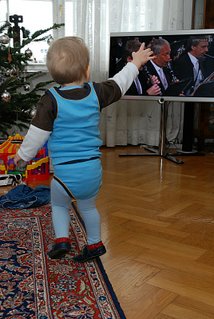
Today was another lazy day, we listened to the New Year's Concert 2008 under Georges Prêtre while we had breakfast, and Elias became inspired to dance to the music after seeing ballet dancers on TV, which was very, very cute.
We did go for a walk around Aigen in the afternoon and Elias had a chance to see real cows in a stable nearby, he looked quite impressed. This was our last vacation day in Salzburg; tomorrow afternoon we will return to Vienna.
Labels: personal
Monday, December 24, 2007
Season's Greetings

Labels: personal
Wednesday, December 19, 2007
I, Blogger
Why now? No particular reason really. I have been playing with the idea of creating a blog and have written up a few blog posts locally without publishing them, just to see how I liked it and what I would have to say. (A few of those early secret blog posts still sit on my hard disk and will eventually show up here retroactively.)
Looking back, I first maintained plogs (for “paper logs”) some 20 years ago when Andrea and I were traveling around in Europe by train. Each of us would write down the experiences of the day, where we went, what we liked and disliked, just about anything that came to mind, in a small booklet. When we were both done with writing, we would read each other's notes, which was great fun.
The intended readership of these plogs was one person. The esteemed readership of this blog may be about the same size currently. By coincidence, Bernhard just started blogging too, so that makes us two late adopters and ensures each of us has at least one reader. Onward.
Next, there was a technology decision to be made: install blogging software or use a hosted service. Ed Costello had shared his experience with getting Movable Type working on pair Networks servers, reading through the steps and given that I wasn't planning to spend more than an hour or two in getting things running I chose to go with a hosted service, Blogger, and have been pretty pleased with it.
Labels: personal, technology
Thursday, December 13, 2007
jQuery and Greasemonkey
It took me a while to figure out why a global variable which one of the dynamically added scripts created was not visible to my Greasemonkey script. Of course the answer was right there in the Greasemonkey documentation: "As of Greasemonkey 0.6.4, however, user scripts now have their own JavaScript context and execute completely separately from the content document." Fortunately, the document window is also accessible as unsafeWindow, and sure enough that worked.
PS. Michael Baierl pointed out a sample Greasemonkey script to load jQuery before executing functions that depend on jQuery—nice!
Labels: javascript, webdevelopment
Sunday, December 9, 2007
Taking Sunday off
We missed him on the way home already, but waking up at 10:30 a.m. without the usual "Mama, Papa, Frühstück, aussa, rasch" was very enjoyable for a change. The weather wasn't great so we stayed home and spent the day messing around.
Elias had a good time and didn't seem to miss us too much.
Labels: personal
Friday, December 7, 2007
The 4-Hour Workweek
Of course even the author will readily admit that one should "not to take the four hours too literally" and it certainly makes a catchier title than "Save an hour per week for things you like", but then anything that means getting more done with less effort and having more time left for the things you really enjoy is good, right?
Ferris may get some basic facts wrong, as readers noted on amazon.com, but he certainly gets his marketing right. His book must have been featured in about every TV show and newspaper by now, judging from the number of comments and the news coverage since. Some claim this book changed their lives while others feel tricked by the simple, well-known recipes -- not everyone is going to make a living from selling nutritional supplements.
Despite the criticism I ordered my copy last month (so I guess the concept worked!) and also added Getting Things Done: The Art of Stress-Free Productivity, which received favorable comments that I can relate to.
The books were in the mail today, and I will start reading them over the holidays. They probably won't significantly change my life but they should make light reading over the holidays and nicely complement the fiction books, and they may even give me some useful ideas for New Year's resolutions.
Saturday, December 1, 2007
Spam filtering with countries.nerd.dk considered harmful
Besides listing addresses of known spam sources or virus-infected machines, there are lists for criteria such as network type (dial-up/cable/DSL) and configuration issues (open relays, RFC non-compliance).
One of my colleagues recently had e-mail to a client rejected by their mail gateway with the error message "554 Your Host 32.nn.nn.nn was found in the DNS BlackList at uk.countries.nerd.dk."
When he asked for help with this, my first thought was that one of our addresses had, rightly or wrongly, been listed as a spam source. However, after looking around countries.nerd.dk it became clear that the recipient was blocking all mail that appeared to come from certain countries according to the countries.nerd.dk database despite the disclaimer on that Website that "countries.nerd.dk is NOT a list of spammers, it is an IP-to-country DNS mapping service."
What's worse in this case is that the mapping was incorrect: The whole 32/8 netblock is declared to be based in the UK: "32.0.0.0/8 :127.0.0.2:Your IP is in uk, rejected based on geographical location". There may be some UK based addresses in that netblock but others are located in North America and possible other places too, and similar geographic mapping services managed to get the location of the particular mail server (almost) right.
Although many open source and commercial mail filters rely on DNSBLs, there has been valid criticism, and even lawsuits against DNSBL operators. The main concern I have is that administrators may rely on a single DNSBL service to mark messages as spam and reject them without understanding the service's reliability and limitations.
Labels: spam, technology
Wednesday, November 28, 2007
Phone line working again
Time went by, and at Friday night nobody had called, and my phone line still was not working, so I called again. After enjoying some 20 minutes of "All service representatives are currently serving other ..." I spoke to someone who admitted that nothing had been done about my problem, and nothing could be done about my problem as it was now out of hours and technical staff would be back on Monday morning, I would get a call.
You probably guessed the response when I called again Monday morning, the problem ticket was still untouched and we scheduled an appointment for an on-site check this morning. My phone line was still dead and my mood had shifted from annoyed to resigned already. Around 2 a.m. in the morning, just about before going to sleep, for some reason I tried one more time and—my phone line was perfectly fine again! (This is like me feeling much better already when I have an appointment scheduled with a doctor, all the symptoms just go away and I question the need to see the doctor. Electronic devices seem to work the same way.)
The one week phone outage had a positive side effect though: Desperately trying to regain the convenience of a desk phone with a headset and a mute button, I successfully connected my mobile phone to my desk phone via Bluetooth. To my great surprise, this works perfectly fine. I can easily accept mobile calls on my desk phone, and choose between land line and mobile phone for outgoing calls ... nice!
Labels: technology
Thursday, November 22, 2007
Nostalgia
Today I picked up some photographs which I had taken with my old Minolta Dynax 7xi SLR on November 1, and what can I say, I was very pleased with the results. Not that the D80 is a bad camera, it is an absolutely fantastic piece of technology, fast and easy to use and absolutely suitable for taking great pictures, but there is something about photography the old-fashioned way too besides the differences in resolution, dynamic range, depth of field, etc.
First, with film you don't end up with dozens of very similar pictures because you only take the one or two that look most promising. There are probably as many good pictures in the gigabytes of digital cruft accumulated on my hard drive, only they are harder to find and who really goes through and cleans out all the not-really-that-great-but-still-acceptable pictures taken digitally?
Second, there is the lack of immediate feedback which helps. Yes, that's right. Admittedly, I did miss the nice bright screen showing me what the picture looks like when I shot on film, so I had to make an effort to get everything right instead of going through several iterations, trying to judge picture quality from an LCD screen.
Third, picking up photographs at the store, flipping through prints which bring back recent memories is a ritual I have become so used to after more than two decades of doing it that I do miss it.
(If you want to know more about the technical aspects, Ken Rockwell has written a great article Film vs. Digital explaining pros and cons, with some eye-opening crops of analog and digital photos. Norman Koren has even more technical details in Digital cameras vs. film although the Website has not been updated in years.)
Back in 1998 John Patrick, then IBM's Vice President, Internet technologies, in his keynote speech at the WWW7 conference in Brisbane talked about how Internet technology impacted our lives and would change expectations. If memory serves, one of the examples he mentioned was the 1 hr photo lab and that people would not be willing to wait for a full hour to see pictures, they would want them right away (and students asking for a T1 at work, too).
Less than ten years later, broadband connectivity is widely available and is cheap, or sometimes free, photography is mostly digital and there are few labs offering decent film developing these days.
Neither would I want to go back to 56K dial-up at EUR 30 per month plus charges per minute, nor would I want to pay per picture (prints for a single roll of film cost another EUR 30), nor would I want to miss the convenience of my digital camera, despite my nostalgic, misty-eyed views.
Labels: photography, technology
